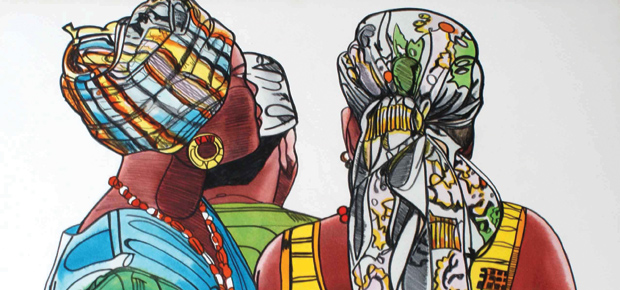Players in the culture sector underscore why Nigeria and Africa’s heritage needs to be preserved at this year’s Distinguished Lecture of the Centre for Black and Culture and International Understanding (CBCIU).
The Centre for Black Culture and International Understanding (CBCIU), Osogbo, Osun State was sent agog, February 3 for its 2018 Distinguished Lecture. The event also used to mark the 67th birthday of the Centre’s Board of Trustees chairman, Prince Olagunsoye Oyinlola, signposted another step in its ongoing revival.
Established in 2009 and has organised programmes, including the First Global Conference on Black Nationalities, Colloquium on Slavery, Slave Trade and its Consequences and The World Conference of Black Mayors, the centre went into a hiatus over a leadership tussle in 2012. Following the resolution of the issue in 2016, it had its first major outing in January 2017 with a colourful three-in-one celebration: the 50th anniversary of the Osogbo Arts’ Movement, the launch of the Centre’s journal and a DVD of Orisa Dances of Nigeria. The exhibition component of the celebration, which also happened in Abuja and later in the US, will be concluded this March in Lagos.
A year and some days after the Osogbo celebration, the centre, now led by an eminent historian, Professor Siyan Oyeweso, affirmed its commitment to boosting culture by organising the lecture on preserving Nigeria’s heritage.
Fittingly, a competent individual with both theoretical and practical knowledge of the subject matter in the person of Professor Tunde Babawale, was chosen as the guest lecturer. But before he took the podium to share his thoughts, Oyeweso and Oyinlola welcomed guests. Oyeweso, who noted the coincidence of the lecture and Oyinlola’s birthday happening on the same day, reiterated the need to preserve Yoruba culture. “What are we going to do to protect our history, culture, and language? This is the challenge before the Yoruba people,” he said.
For Oyinlola, it is imperative to protect Nigeria and Africa’s cultural heritage in the face of various threats. He said: “As at today, it is evident that our national treasures and heritage in Nigeria and, indeed, Africa, are fast going extinct. Typical of our environment, we are often consumed by civil strife and all forms of instability that threatens the continued survival of these national treasures. Aside from this, we are also aware of how religious beliefs in certain countries contribute to the destruction or desecration of priceless heritage sites. Sites in Libya, Mali, Egypt, Algeria among others on the continent, have been vandalised due to internal and cross-border conflicts.
“In Iraq and Syria, ISIS continues to destroy history and heritage sites with the claim that they are eliminating signs of polytheism. Incidentally, the destruction of heritage sites is a violent act and the primary motive of those responsible is to forcefully erase a facet of history targeted at material culture. In short, Africa’s rich heritage is under extreme threat.”
The ex-governor, who highlighted how Nigeria would have lost the Osun Grove, one of the country’s UNESCO World Heritage Sites, to activities including deforestation, hunting, religious conversion, fishing, felling of trees and hunting, but for the intervention of the late Adunni Olorisha (Suzanne Wenger), stressed that the protection and projection of all the country’s national heritage is a job for all. “It is, therefore, important to ensure that we collectively help to protect these treasures to keep our memories of the past alive. While we try as much as we can to carry this out as a collective duty, we must also ensure that we project the heritages around us,” he said.
In his lecture entitled Reflections on the need for the promotion of Nigeria’s cultural heritage, Babawale, a professor of Political Economy and International Relations at the University of Lagos, defined culture and stated its importance. For him, “culture is fundamental to humans; it is mankind’s defining characteristic, apart from physical presence, that differentiates humans from the lower animals.” Its attributes, he further noted, included dynamism, sensitivity and being non-hereditary.
The former Director General of the Centre for Black and African Arts and Civilization (CBAAC), further explained that cultural heritage was one of the indices of the civilisation of a people but that “the cultural heritage of the Nigerian peoples as manifested in their music, performances, costumes, body adornment, languages, religions, indigenous knowledge, laws, medicine, hospitality, values, cuisine recreational games, art and crafts, rites of passage, architecture, etc. have come under the corrosive impact of foreign cultural values as a result of modernism, urbanisation and globalisation.”
He expressed regret that “the orientation and focus of Nigerians have been altered drastically in all areas of life, namely; language, religion, mode of dressing, beliefs, value systems, politics, economy, etc. leading to the disappearance of virtues such as hard work, perseverance, honesty, transparency, accountability and above all, the omoluabi qualities which was the ultimate and a necessary requirement for good citizenry and true development.”
The professor noted the neglect of indigenous genres, including Juju, Sakara, Highlife, Afrobeats and Akwete laden with wisdom and philosophy for modern music that “has now become a medium, not for the promotion of societal values but an avenue for undermining moral values, ridiculing feminity, encouraging criminality and materialism.”
He also touched on the abandonment of cultural costumes for Western ones; how it has become fashionable for Nigerian children to speak English and French fluently but be unable to speak our own indigenous language and the wholesale adoption of foreign religion and architecture.
For the lecturer, the factors militating against the preservation of cultural heritage include diffidence, both on the part of successive governments and the people; poor government attitude to the teaching and funding of the arts and culture sector and lack of vision to harness the gains derivable from cultural heritage and brands. Others are discrimination against practices and icons of cultural heritage and indiscriminate adoption of foreign models and the inability to adapt these models to serve local needs.
Though the situation appears bleak, Babawale held that all was not lost if certain remedial actions were promptly taken. These include improved funding of the cultural sector and appointments of real culture professionals by governments; putting culture first in all we do and ensuring that indigenous cultural practices and languages are taught in schools and used as mediums of instruction.
“Cultural products such as festivals, artifacts, heritage centers, monuments, costumes, knowledge, values, farm produce, and so on should be packaged as alternatives to crude oil in revenue generation,” Babawale submitted to a standing ovation.
Commendably, the event, which also featured the cutting of a birthday cake by Prince Oyinlola and his wife, Omolola, had its fair share of performances. The Osun State Cultural Troupe, Elewele Group, and chanter, Sulaiman Ayilara (Ajobiewe), added colour to the occasion attended by royalty, academics, artists, and people who served in Oyinlola’s administration, including his then spokesperson, Dr Lasisi Olagunju.
Social Media Links
Facebook – www.facebook.com/osundotlife
Instagram – www.instagram.com/osundotlife
Twitter – www.twitter/osundotlife
Kindly share this story | All rights reserved. This material, and other digital content on this website, may not be reproduced, published, broadcast, rewritten or redistributed in whole or in part without prior express written permission from OSUNDOTLIFE.
Contact: editor@osun.life
WhatsApp: 📲 +2348092333666

